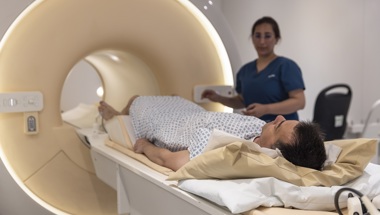Research
02 May 2024New screening trial to save thousands of men’s lives from prostate cancer
Thousands more men could be saved every year as our new screening trial, TRANSFORM, aims to double the efficacy of screening for prostate cancer.

We’re now able to share more details of our £42million TRANSFORM screening trial that aims to find the best way to screen men for prostate cancer and double the number of lives saved.
TRANSFORM will bring together six of the world’s top prostate cancer researchers to lead the team taking on the biggest prostate cancer screening trial for 20 years.
They represent four of the UK’s biggest research centres and will work alongside 16 co-applicants from across the country. They are:
- Professor Hashim Ahmed, at Imperial College London
- Professor Ros Eeles, at The Institute of Cancer Research, London
- Professor Mark Emberton, at University College London
- Professor Rhian Gabe, at Queen Mary University of London
- Professor Rakesh Heer, at Imperial College London
- Professor Caroline Moore, at University College London
The research team will compare multiple methods of screening, both against each other and against how men are tested now, to find the safest, most accurate and most cost-effective way to screen men for prostate cancer.
TRANSFORM will begin recruiting men from across the UK in the next 12 months.

Comparing four approaches to screening
Previous trials using PSA blood tests and biopsy to screen for prostate cancer have shown that it is possible to prevent between 8% and 20% of prostate cancer deaths depending on how regularly men are screened.
TRANSFORM will test new approaches that have the potential to more than double this impact and reduce prostate cancer deaths by 40%.
With more than 12,000 prostate cancer deaths in the UK alone this could mean thousands of men saved each year in the UK, and many thousands more worldwide.
In the first stage of the trial, taking around three years and involving around 12,500 men, the researchers will look at four potential screening options. These include PSA blood tests, faster versions of MRI scans, and genetic testing to identify those at higher risk.
These new approaches will be compared to the current NHS diagnostic process to show which methods are most accurate and should therefore be taken forward into the second, larger stage of the trial.
The trial is designed so that the results from this stage, especially about the benefits and harms of the tests used in the NHS today, will provide valuable insight and could inform the way men are tested for prostate cancer.

In the second stage, the researchers will test the most promising option or options from stage one in up to 300,000 men to provide the definitive evidence for the best way to screen men for prostate cancer.
This stage is where we expect to see results on newer, more innovative techniques for screening.
The team will follow up these men over at least 10 years to track how these screening approaches affect both the number of men’s lives saved, and the number of men experiencing harms from potentially unnecessary biopsies and treatment.
Prostate cancer is the most common cancer without a screening programme and it’s about time we changed that.
Screening could save thousands of lives
Dr Matthew Hobbs, our Director of Research, said: “Prostate cancer is the most common cancer without a screening programme and it’s about time we changed that.
“That’s why I’m so delighted and proud to announce TRANSFORM. This is the research that will get us to a screening programme. It’s the biggest research investment we’ve ever made – but by putting this money in now, we expect to double the number of men that could be saved by screening, while at the same time reducing any harm caused.
“This could save thousands of men’s lives every year in the UK alone. But it won’t just be the UK – this trial could change practice globally, so we’re into tens of thousands of men saved each year.
“This is a pivotal moment in the history of prostate cancer research and we’re proud to be leading the way, and to be supporting some of the best researchers in the world to make it happen.”







